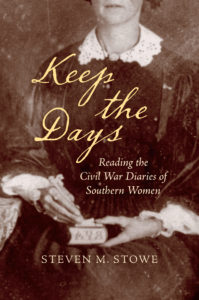Steven M. Stowe: Understanding People We Don’t Like
 Today we welcome a guest post from Steven M. Stowe, author of Keep the Days: Reading the Civil War Diaries of Southern Women, just published by UNC Press.
Today we welcome a guest post from Steven M. Stowe, author of Keep the Days: Reading the Civil War Diaries of Southern Women, just published by UNC Press.
Americans wrote fiercely during the Civil War. War surprised, devastated, and opened up imagination, taking hold of Americans’ words as well as their homes and families. The personal diary—wildly ragged yet rooted in day following day—was one place Americans wrote their war. Diaries, then, have become one of the best-known, most-used sources for exploring the life of the mind in a war-torn place and time. Delving into several familiar wartime diaries kept by women of the southern slave-owning class, Steven Stowe recaptures their motivations to keep the days close even as war tore apart the brutal system of slavery that had benefited them. Whether the diarists recorded thoughts about themselves, their opinions about men, or their observations about slavery, race, and warfare, Stowe shows how these women, by writing the immediate moment, found meaning in a changing world.
Keep the Days is now available in both print and ebook editions.
###
Understanding People We Don’t Like
I read the personal diaries of slave-owing white women during the U.S. Civil War because I want to learn how it was to live their lives, especially the linchpin experience of an enslaver: to live comfortable, thoughtful days believing herself a good person while helping to make a murderous, racist slave regime. I look to diaries to shed light on how this worked in a woman’s daily life.
A diary isn’t a simple piece of writing, though it might seem so. It’s a sleepy text, wandering and slow to focus, a kind of on-going rough draft of a life. The diarist is not scamming anyone or preening herself for us. She has not a thought for us, or for consistency, and her urge to tell things is not an urge to have readers. Often she just drops a scene onto the page, impulsive or careless. Even from the pen of a long-dead slave-owning woman, such frank moments invite curiosity.
Reading, I realized that there were grounds for empathy with these diarists. Not sympathy—closeness and caring—for these are very unsympathetic women. Empathy turns on difference, not likeness. Openings for empathy are a way into a foreign, even alienating, frame of mind. It’s a touchy move to make because you have to spend a lot of time with people you don’t like. But I wanted some ground cleared between the women and me where I could understand their world as they lived it. Understanding follows from empathy, not the other way around.
Where is the ground for empathy with the women who kept diaries? One patch of it is that both the diarist and I are writers, and we both want to write the Civil War. We both struggle with language and time, and we take pleasure in putting the world into words. I came to see, too, what it might mean to write your “good” life and then have your life blow up. I’m glad their world is gone, but I understood from them—and am watchful about—how likely it is that I blindly trust my own “good” life. A further ground for empathy: both the diarist and I are white. Diarists wrote arrogantly and patronizingly about African Americans in ways all too familiar. But they also wrote in quieter ways that the diary is especially good at catching, ways that inscribed the diarist as a white person free to choose what to say or not say. A person who can write her daily thoughts, casually or intensely, knowing that she can always come back to re-think. Or she can turn away and leave. These are a diarist’s moves, ordinary and open-faced. In a white woman’s diary they speak of the subtle ways she worked the privileges of her race into her “good” life.
A small example of what I mean. Late in the war, the diarist Lucy Breckinridge wrote an unprecedented scene that she never mentioned again: she had just witnessed her young nephew beating Preston, a slave boy his age, with a stick, encouraged by his mother, Breckinridge’s sister. Looking on with “suppressed rage” was Preston’s mother, Viola. Breckinridge was moved to tears and wrote that she felt deeply for Viola, and she criticized her sister and her “wicked” nephew. It’s a harrowing encounter with heated words from a young diarist who almost never mentioned black people or slavery. Then she wrapped up the scene. She resolved that her future children would never do such a thing with her future slaves. She was proud that she had been raised to respect “servants”. With this, she moved on. But what does the diary keep? A moment from slavery’s deep well of violence suddenly flowing into Breckinridge’s pages. She wrote it in sharp detail, and then she turned away from it to a look at herself, her exceptional self, and made herself a haven where she was free to go. I think this is how it worked.
###
Steven M. Stowe is professor emeritus of history at Indiana University, Bloomington.

You must be logged in to post a comment.